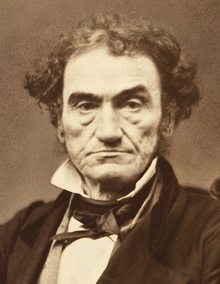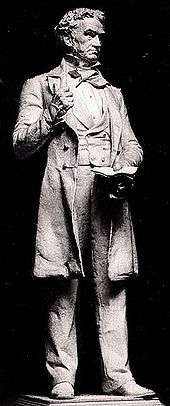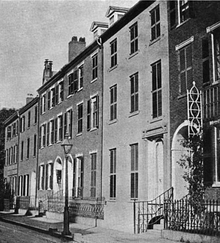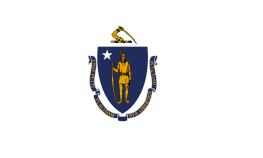Rufus Choate
Rufus Choate (October 1, 1799 – July 13, 1859) was an American lawyer, orator, and Congressman.
Rufus Choate | |
|---|---|
 | |
| United States senator from Massachusetts | |
| In office February 23, 1841 – March 4, 1845 | |
| Preceded by | Daniel Webster |
| Succeeded by | Daniel Webster |
| Member of the U.S. House of Representatives from Massachusetts's 2nd district | |
| In office March 4, 1831 – June 30, 1834 | |
| Preceded by | Benjamin W. Crowninshield |
| Succeeded by | Stephen C. Phillips |
| 10th Massachusetts Attorney General | |
| In office 1853–1854 | |
| Governor | John H. Clifford |
| Preceded by | John H. Clifford |
| Succeeded by | John H. Clifford |
| Member of the Massachusetts Senate | |
| In office 1827 | |
| Member of the Massachusetts House of Representatives | |
| In office 1825–1826 | |
| Personal details | |
| Born | October 1, 1799 Ipswich, Massachusetts, U.S. |
| Died | July 13, 1859 (aged 59) Halifax, British Canada |
| Political party | Whig |
| Relatives | George Cheyne Shattuck Choate (first cousin once removed) Joseph Hodges Choate (first cousin once removed) |
| Alma mater | Dartmouth College Harvard University |
| Profession | Law |
Early Life
Rufus Choate was born in Ipswich, Massachusetts, the son of Miriam (Foster) and David Choate, a teacher and Revolutionary War veteran.[1] He was a descendant of an English family which settled in Massachusetts in 1643.[2] His first cousin, physician George Choate, was the father of George C. S. Choate and Joseph Hodges Choate. Rufus Choate's birthplace, Choate House, remains virtually unchanged to this day.
A precocious child, at six he is said to have been able to repeat large parts of the Bible and of Pilgrim's Progress from memory. He was elected to Phi Beta Kappa[3] and graduated as valedictorian of his class at Dartmouth College in 1819, was a tutor there in 1819–1820.
In the fall of 1820 he was entered at the Dane Law School in Cambridge, under the instruction of Chief Justice Parker and Professor Asahel Stearns. In the following year Choate studied in Washington, D.C. in the office of William Wirt, then Attorney General of the United States.[4]
Career

He was admitted to the Massachusetts bar in 1823 and practiced at what was later South Danvers (now Peabody) for five years, during which time he served in the Massachusetts House of Representatives (1825–1826) and in the Massachusetts Senate (1827).
In 1828, he moved to Salem, where his successful conduct of several important lawsuits brought him prominently into public notice. In 1830 he was elected to Congress as a Whig from Salem, defeating the Jacksonian candidate for re-election, Benjamin Crowninshield, a former United States Secretary of the Navy, and in 1832 he was re-elected. His career in Congress was marked by a speech in defence of a protective tariff.

In 1834, before the completion of his second term, he resigned and established himself in the practice of law in Boston. Already his reputation as a speaker had spread beyond New England, and he was much sought after as an orator for public occasions. For several years, he devoted himself unremittingly to his profession but, in 1841, succeeded fellow Dartmouth graduate Daniel Webster in the United States Senate. Shortly afterwards he delivered an address at the memorial services for President William Henry Harrison at Faneuil Hall.
In the Senate, he spoke on the tariff, the Oregon boundary, in favor of the Fiscal Bank Act, and in opposition to the annexation of Texas. On Webster's re-election to the Senate in 1845, Choate resumed his law practice. He later served a short term as attorney-general of Massachusetts in 1853–1854. In 1846, Choate convinced a jury that the accused, Albert Tirrell, did not cut the throat of his lover, or, if he did so, he did it while sleepwalking, under the 'insanity of sleep'.[6] His successful use of sleepwalking as a defense against murder charges was the first time in American legal history this defense was successful in a murder prosecution.[7] He was a faithful supporter of Webster's policy as declared in the latter's Seventh of March Speech of 1850 and labored to secure for him the presidential nomination at the Whig National Convention in 1852. In 1853, he was a member of the state constitutional convention.
In 1856, he refused to follow most of his former Whig associates into the Republican Party and gave his support to Democrat James Buchanan, whom he considered the representative of a national instead of a sectional party.
Health
In 1850 Choate traveled Europe for three months to improve his health. He was accompanied by his old friend and well-known lawyer, the Hon. Joseph Bell, who married Choate's sister.[4]
In 1859, failing health led him to seek rest yet again in Europe. In June 1859, he sailed from Boston to England, became worse and left the ship at Halifax, Nova Scotia, where he had died on July 13.[4]
Family
With his wife Helen Olcott, whom he married on March 29, 1825, Choate had seven children: Catherine Bell (1826-1830), an infant child (1828-1828), Helen Olcott (1830-1868), Sarah (1831-1875), Rufus (1834-1866), Miriam Foster (1835-??), and Caroline (1837-1840).[4]
Legacy
Choate's private library contained seven thousand books with three thousand volumes in his law library.[4]
Works
- Works — edited, with a memoir, by S. G. Brown, and published in two volumes at Boston in 1862
- Memoir — published in 1870
- EG Parker's Reminiscences of Rufus Choate (New York, 1860)
- EP Whipple's Some Recollections of Rufus Choate (New York, 1879)
- Albany Law Review of 1877–1878
- Claude Fuess' Rufus Choate, The Wizard of the Law (1928)
- The Political Writings of Rufus Choate (2003)
Further reading
- Chisholm, Hugh, ed. (1911). . Encyclopædia Britannica (11th ed.). Cambridge University Press.
- Attribution

References
- http://www.encyclopedia.com/people/history/us-history-biographies/rufus-choate
- Jameson, Ephraim Orcutt. The Choates in America. 1643–1896. John Choate and His Descendants. Chebacco, Ipswich, Mass. Boston: A. Mudge & Son, printers, 1896.
- Dartmouth to honor two valedictorians, Dartmouth Press Release, June 2009. Retrieved 2009-10-09.
- Cogswell, J. B. D. (John Bear Doane), 1829-1889 (1884). Memoir of Rufus Choate. The Library of Congress: Cambridge : J. Wilson.CS1 maint: multiple names: authors list (link)
- State Street Trust Company. Forty of Boston's historic houses. 1912.
- "Maria Bickford". Brown University Law Library. Archived from the original on 2007-11-21. Retrieved 2007-11-22.
- Kappman (ed), Edward W. (1994). Great American Trials. Detroit, MI: Visible Ink Press. pp. 101–104. ISBN 0-8103-9134-1.CS1 maint: extra text: authors list (link)
External links
| Wikiquote has quotations related to: Rufus Choate |
- United States Congress. "Rufus Choate (id: C000375)". Biographical Directory of the United States Congress.
- Reminiscences of Rufus Choate by Edward Parker, published 1860.
- The Works of Rufus Choate: With a Memoir of His Life by Samuel Gilman Brown, published 1862.
- Memories of Rufus Choate by Joseph Neilson, published 1884.
| U.S. House of Representatives | ||
|---|---|---|
| Preceded by Benjamin Crowninshield |
Member of the U.S. House of Representatives from Massachusetts's 2nd congressional district 1831 – 1834 |
Succeeded by Stephen C. Phillips |
| U.S. Senate | ||
| Preceded by Daniel Webster |
U.S. senator (Class 1) from Massachusetts 1841 – 1845 Served alongside: Isaac C. Bates |
Succeeded by Daniel Webster |
| Political offices | ||
| Preceded by John H. Clifford |
Attorney General of Massachusetts 1853 – 1854 |
Succeeded by John H. Clifford |


